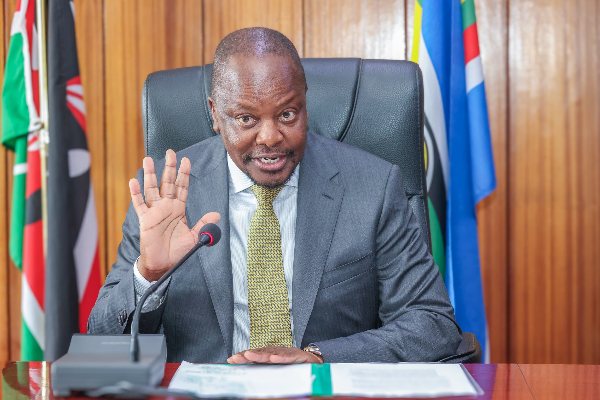Kenya is set to become the first African country to finalise the JobsConnect Compact, a global framework poised to deliver 6 million new, greener and dignified jobs by 2030.
Cabinet Secretary for Agriculture and Livestock Development, Sen. Mutahi Kagwe, announced the milestone during a briefing with the World Bank Regional Office leadership and founding members of the MADE Alliance from Mastercard, Equity Bank, Microsoft, and the Kenya National Farmers Federation (KENAFF).
The session brought together key sector partners, including Florence Kariuki, Daniel Huba and Jane Gidali from Mastercard; Magdalene Alukhava from KENAFF; and Priya Chana, Nawa Lubasi and Harold Mate from Equity Bank.
Kagwe confirmed that all government-led agricultural digitisation efforts have now been consolidated under the Kenya Agriculture Data and Information Centre (KADIC), which will serve as the core repository for the country’s agricultural data ecosystem, including KIAMIS.
As part of this transition, the Agriculture Information and Resource Centre (AIRC) will be rebranded to KADIC to eliminate duplication, improve efficiency, and strengthen real-time linkages among farmers, counties, cooperatives, markets and processors.
KADIC Director Betty noted that the Centre will lead the rollout of the Digital Agriculture Roadmap (DAR), set for launch next year.
Juma Salim, Director of Digital at KADIC, emphasized that integrating data from the Ministry’s 31 parastatals will ensure faster, more actionable insights for decision-making and service delivery.
The JobsConnect Compact is anchored on four pillars—job creation, food and nutrition security, import substitution, and export growth—with targeted outcomes including the creation of 5.3 million jobs, reducing the food-insecure population by 10 million people, cutting food imports by USD 2–3 billion, and increasing agricultural export earnings by USD 5 billion.
Kagwe underscored the centrality of digital agriculture in transforming farmer incomes and attracting youth into a modern, technology-driven sector.
He highlighted an ongoing human resource transition within the Ministry, with 30% of departmental heads due to retire, 20% already retired, and over half the workforce expected to exit within two years.
He described this shift as an opportunity to rebuild institutional capacity through Agri-Connect programmes, agri-preneurship training, Kenya Agriculture College, and expanded digital soil testing services.
Development partners expressed their alignment with the digitisation agenda. Mastercard showcased its digital payment infrastructure, revealing that only 2% of farmer transactions currently pass through M-Pesa—constraining financial visibility and potential credit access.
Equity Bank reaffirmed agriculture as a core investment pillar and committed to supporting initiatives that boost productivity, household savings and long-term farmer wealth.
Kagwe reiterated the need for affordable financing, noting that agriculture cannot thrive under 18–19% commercial lending rates. He advocated for a 5% guaranteed agricultural credit model as the most sustainable way to unlock sector growth.
He also pointed to major government investments—such as the KSh 61 billion fertilizer subsidy programme and a KSh 17 billion credit facility—as crucial interventions to stabilise production, lower input costs and drive Kenya’s transition to a resilient, digitised and green agricultural economy.








